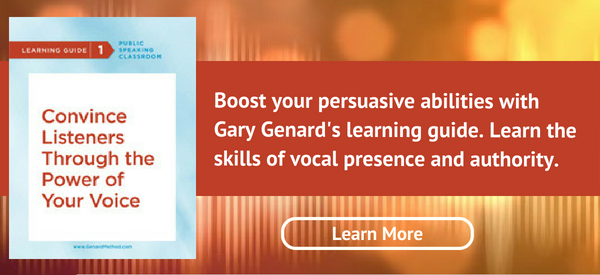Improving your speech for business is a power move. Here are 5 ways to make your voice come to life for valued stakeholders!
"The eyes are windows to the soul," it is said. When it comes to fullness of expression and subtleties of meaning, though, I'd say the voice gives the eyes a run for their money.
That's certainly true when you're speaking professionally, isn't it? Try closing a sale or getting the leadership team to buy into your idea by looking at them the right way!
Speaking of leadership, do you command the stage? Learn how in my Free ebook, High-Impact Speaking: The Leader's Guide to Presenting with Integrity and Influence.
We may easily think of speech improvement as a worthwhile pursuit. Voice (the production and manipulation of sound) is different from speech, however, and brings its own unique value to public speaking. It has the power to help you connect with your audience, convey great subtleties of meaning and emotion, and help your ideas come to life. Below are five ways to tap into this most versatile of the public speaking tools in performance.
1. Project Your Voice for a Powerful Sound
It's also said that in ages past, giants walked the earth. Imagine what their voices must have been like! The truth is, we're not only not giants, but we've actually shrunk our voices to our detriment as influencers.
Learn how to improve your vocal delivery to influence others! Grab my Free Cheat Sheet, "The 5 Key Tools of Vocal Dynamics." Make your voice come to life!
We've become lazy users of our voices, because it's been so easy to take that path. No longer do we need to put strength into our voices to be heard in adjacent fields, in the noisy marketplace, or public arenas where we voiced our opinions. Now, we wear microphones or speak into smartphones or sit 18" from computer screens on video calls. A caller in Savannah in now only inches away from someone in Singapore! We speak thinly and breathe shallowly. Actually, we breathe shallowly because we know we don't need our voice to do much.
When you speak in public, however, you're the leader in the room. And part of what gets audiences to lend you credibility and authority is your voice. That means you need power in your vocal expression. And that in terms means breathing properly. Learn to use your diaphragm to get full, deep breaths (you can tell when you're doing it correctly because your belly will move outward upon each inhalation). Breath is your power for projecting your voice.
What about projecting presence to move audiences—in person and virtually? Discover how in my Free ebook, 12 Easy Ways to Achieve Presence and Charisma.
2. Make the Sense of What You Mean Clear
Have you spoken about your area of expertise so often that you sometimes rattle your way through it? Sure, you have. When that happens, words and phrases get lost—sometimes important ones. We also forget that many times, listeners aren't knowledgeable in our field; or at the very least, haven't heard us talking about this particular topic before.
Therefore, we need to make it easier for them. There's a theater phrase operative word, that can help here. It means to "punch" up the word or phrase that drives the meaning of the sentence. So when you say, "We see this as an opportunity for extraordinary profits" the allure of that phrase comes through loud and clear. Record yourself and listen to only the audio portion of your talks. Put yourself in the "ear" of your listeners and ask if the heart of what you're saying each time you express an idea is coming through by the use of operative word.
Are you achieving maximum effectiveness in performance? Learn how in my essential resource, "Great Speaking? It's About Performance Over Content!"
3. Allow People to Hear What You Feel
Somehow, passion gets a bad rap when it comes to speaking for business. The truth is, emotions are an essential part of how we receive information and judge whether it's of importance to us. Our emotional lives, in other words, are a vital part of our make-up as audiences listening to anything.
Actually, emotions in public speaking are more important than that. Neuroscientists know that any decision we make has an emotional component. So, how can you ever convince listeners to change their thinking or behavior if you don't tap into their emotions?
As a speaker, you should accept that emotions are a super-highway to influence. Feel free then, to include an emotional approach where appropriate. And don't shy away from emotional language—it's the perfect tool to help audiences to the right response. So, always, allow people to hear what you feel through your voice.
Learn more about how to speak with influence! Download my Free eGuide, "4 Characteristics of An Influential Speaker."
4. Help Your Listeners Stay Engaged
Your voice is important in this regard for two reasons. The first, of course, is that speaking in a monotone is a great way to get audiences to zone out in a serious way. Your voice should be a mountain range with peaks, valleys, hills, and uplands and lowlands, not a plateau.
Just as important, you should use your voice to help transition between the main points of your speech. Here's why this is important. Presentations without clear transitions can sound like unceasing accumulations of data. More and more information is thrown the audience's way, and it all sounds alike. Listeners can begin to feel surfeited, because they are not being fed data in bite-sized pieces that they can manage.
The solution is to make each section of your talk stand out on its own, with an obvious transition before the next segment. This allows the audience to say, "Ah, good. That's the end of that. Let me hit the refresh button in my brain. Here comes some new information. Okay . . . I'm ready." How do you accomplish this in performance? By doing two things: (1) pausing significantly, and (2) doing something different with your voice. It doesn't matter what. We'll get that something new has just arrived.
5. Use Your Most Surprising Tool: Silence
Now for the secret weapon in your public speaking arsenal: silence. Actors understand the drama and thunder a moment of silence can produce onstage, and so should you.
The interesting thing about silence employed well, is that it isn't just the cessation of sound. It is that; but it is only the sound that is stopped. The idea continues across the gap in phonation. So, you can understand how a well-chosen moment of silence can give emphasis, and sometimes considerable power, to an idea.
The thing is, most of us don't trust silence. Somehow, we always want to fill it! (Those vocalized pauses using "uh," "um," and "like" are examples of that.) Instead, learn to trust silence. For one thing, if you take a presentation at precisely the speed you want to, you'll demonstrate power and control. Just as important—at least to me—think of the drama you'll generate!
You should follow me on Twitter here.
Gary Genard is an actor, author, and expert in public speaking training and overcoming speaking fear. His company, Boston-based The Genard Method offers live 1:1 Zoom executive coaching and corporate group training worldwide. In 2021 for the eighth consecutive year, Gary has been ranked by Global Gurus as One of the World’s Top 30 Communication Professionals. He is the author of the Amazon Best-Seller How to Give a Speech. His second book, Fearless Speaking, was named in 2019 as "One of the 100 Best Confidence Books of All Time." His latest book is The Online Meetings Handbook, now available at The Genard Method and at Amazon. To know more about TGM's services, Contact Gary here.







